Programas de transferencias monetarias sectoriales
Los PTM pueden ayudar a las personas en situaciones de crisis a abordar sus necesidades dentro de un determinado sector humanitario, tales como: agua, alimentos, salud, vivienda, medios de vida, o protección. Los PTM sectoriales pueden ser restringidos o sin restricción, condicionales o incondicionales, y normalmente serán proporcionados como parte de un paquete integral que puede incluir asistencia en especie o servicios.
Cada sector tiene que considerar distintas preguntas, retos, ventajas y riesgos cuando se trata de apoyar la recuperación de las personas dentro de su área de especialización. Esto requiere evidencias, herramientas, orientación y capacidad. Para cumplir los resultados sectoriales a través de los PTM también se requiere de una comprensión multisectorial de las necesidades y de la seguridad económica de los hogares (vea las Transferencias monetarias multipropósito). Mientras que algunos sectores tienen mucha experiencia en la implementación de los PTM y lo han hecho por muchos años, otros se están poniendo al día. La mayoría de los sectores humanitarios están comprometidos y han venido aumentando sus esfuerzos en los PTM sectoriales. El Grupo global de coordinación de clusters (GCCG, por sus siglas en inglés) también se encuentra coordinando el trabajo entre clusters para mejorar la utilización sectorial de los PTM.
Prioridades actuales
La CALP Network trabaja en estrecha colaboración con los grupos técnicos de asistencia en efectivo y equipos de tareas dentro de los clusters globales, que han estado definiendo sus prioridades y planes de trabajo del 2020 durante sus reuniones regulares. Una descripción general y detalles específicos de estas prioridades en cada cluster global está disponible aquí.
Subpáginas de los PTM sectoriales
-
Coordinación y gestión de campamentos y programas de transferencias monetarias
-
Educación y programas de transferencias monetarias
-
Seguridad alimentaria y programas de transferencias monetarias
-
Salud y programas de transferencias monetarias
-
Nutrición y programas de transferencias monetarias
-
Protección y programas de transferencias monetarias
-
Alojamiento y programas de transferencias monetarias
-
Agua, saneamiento e higiene (WASH) y programas de transferencias monetarias
Contenido destacado
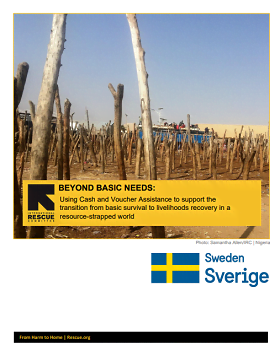
Beyond Basic Needs: Using Cash and Voucher Assistance to Support the Transition from Basic Survival to Livelihoods Recovery in a Resource-Strapped World
Guidelines and Tools
Do you think of yourself as a “cash” person OR as a “livelihoods” person? An “emergency” practitioner OR a “recovery” practitioner? Or do you find yourself unsatisfied with the often narrow implications of these terms? We’ll never have enough funding to provide basic needs support to everyone who needs it for the entire time they are in need, even if we take advantage of the...

Looking into 2020: short overview on global clusters, CVA and the CALP Network
Presentation
Overview as 2020 begins:
• Significant progress and commitment from all global clusters on integration of CVA into their work.
• Significant interest in different regions and by some donors on sector-specific CVA.
• Challenges that remain:
o Dialogue: 1) Ensuring CVA specialists understand sector specificities and successfully bank on the technical expertise emanating...

Building Evidence to inform the Effective Use of CASH and Voucher Assistance in Emergency Sanitation and Hygiene Programming
Report
An analysis of 5 case studies of utilization of CASH/Voucher Assistance are presented and analysed in the attempt of building evidence on their utilization in emergency WASH Sanitation and HP programming. Findings and recommendations are provided on Coordination, Situation and Response Analysis, Program Design, Implementation, Monitoring and Evaluation.
Últimos recursos

Electronic Cash Grants in Emergencies: Approaches and lessons learned
Report
Cash distributions in an emergency: A concept that seems so obvious today yet has only recently gained recognition within humanitarian response programming for its speed, efficiency and—above all—effectiveness.
This document provides a snapshot for humanitarian response peers on best practices,...
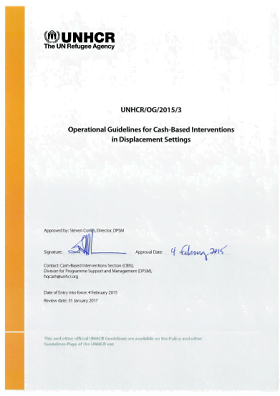
Operational Guidelines for Cash-Based Interventions in Displacement Settings
Report
These operational guidelines support UNHCR and partner staff to determine if and when cash-based interventions (CBIs) are appropriate to meet the needs of refugees and other persons of concern and aids the design and implementation of effective programmes. It focuses on the needs of refugees, but can...

A Review of Evidence of Humanitarian Cash Transfer Programming in Urban Areas
Report
Urban poor populations frequently experience disasters of varying typology and intensity. When set against a backdrop of poverty and marginalisation, their needs can be complex. As recent urban crises have pushed humanitarian agencies to respond in urban areas, this literature review examines the...

Exploring Food Assistance Programmes: Evidence for Lebanon
Report
The purpose of this study is to analyse how markets in Lebanon have responded to the increased demand from the Syrian refugees. More specifically, the study focuses on the micro-level impacts of market-based food assistance on the market supply chains and market performance. It explores the pros and cons...

Research on Food Assistance for Nutritional Impact (REFANI): Literature review
Report
The REFANI literature review identifies existing evidence on the use of Cash Transfer Programmes (CTPs) and the impact of CTPs on acute malnutrition in humanitarian contexts. The review is structured as follows: Section A discusses the global burden of acute malnutrition; Section B highlights...
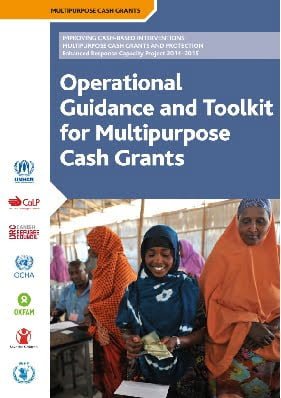
Operational Guidance and Toolkit for Multipurpose Cash Grants
Guidelines and Tools
This operational guidance and toolkit brings together worldwide expertise on cash-based interventions (CBIs). It provides comprehensive and practical guidance for humanitarian actors to assess the feasibility, conceptualise the design and structure the implementation of MPGs. The guidance focuses on...

Cash Transfer Programming for Syrian Refugees: Lessons Learned on Vulnerability, Targeting, and Protection from the Danish Refugee Council’s E-Voucher Intervention in Southern Turkey
Report
DRC Turkey is currently implementing a two-year, DFID-funded project that aims to provide immediate support to and strengthen the coping mechanisms of vulnerable non-camp Syrian refugees in southern Turkey. The first phase of the project focused on identifying and providing monthly cash transfers (in the...
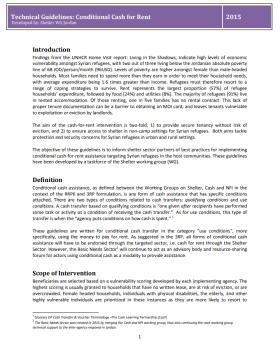
Technical Guidelines: Conditional Cash for Rent
Guidelines and Tools
The guideline was prepared by UNHCR Shelter Working Group in Jordan with the objective of informing shelter sector partners of best practices for implementing conditional cash-for-rent assistance targeting Syrian refugees in the host communities. The guide explores how to define the scope of a cash...

Philippines Haiyan Response – A multi-sectoral review of the use of market analysis and the design and implementation of CTPs
Report
Following Typhoon Haiyan, which hit the Philippines on November 8 2014, at least 45 aid agencies chose to implement Cash Transfer Programming (CTP) to assist the more than 16 million people affected. Cash transfers were a logical approach in a country with developed market systems, strong financial...

Value for Money of Cash Transfers in Emergencies
Report
The objective of this study is to analyse evidence on the Value for Money (VfM) of cash transfers. The study reviews evidence on the economy, efficiency and effectiveness of cash, vouchers and in-kind transfers, in order to support a more structured analysis of the VfM of different transfers. It is based...
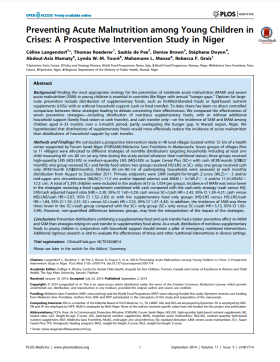
Preventing Acute Malnutrition Among Young Children in Crises: A prospective intervention study in Niger
Report
Governments and donor agencies need to know which preventative strategy is most effective, particularly among children under 2 years old who are most vulnerable to acute malnutrition. Here, the researchers compare the effectiveness of seven preventative strategies—including the distribution of...
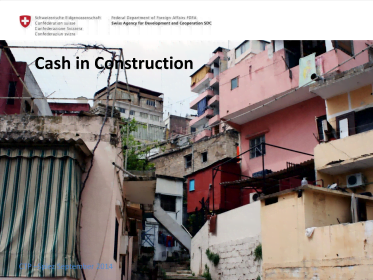
Cash in Construction
Presentation
This Powerpoint was used by SDC during a workshop on CTP and shelter/construction that took place in mid 2014. Click here to download a short introduction Powerpoint on Cash and Shelter from the same event.
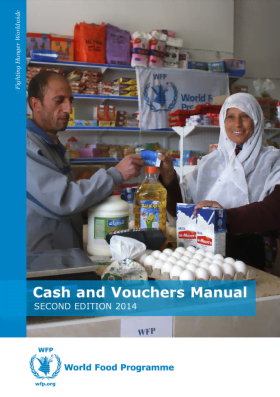
Cash and Vouchers Manual – Second edition
Guidelines and Tools
This second edition of the Cash and Vouchers Manual captures the latest corporately endorsed business processes and procedures, providing the most up-to-date tools (i.e. analytical, assessment, monitoring) that have been developed through close intra-departmental collaboration between Headquarters...
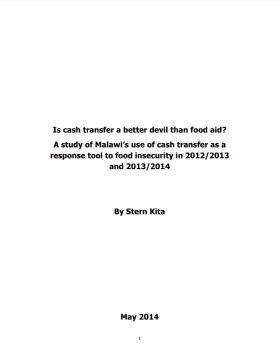
Is Cash Transfer a Better Devil than Food Aid? A study of Malawi’s use of cash transfer as a response tool to food insecurity in 2012/2013 and 2013/2014
Report
The 2004 Indian Ocean Tsunami is considered as the first humanitarian situation where cash transfers were used as an alternative to food aid. Since then, cash transfers have been used as a standalone response tool to disasters, or used in combination with food aid. Malawi piloted the use of cash...
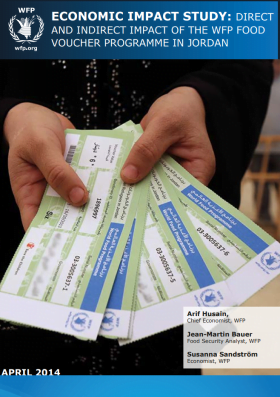
Economic Impact Study: Direct and indirect impact of the WFP food voucher programme in Jordan
Report
The intent of this study is to estimate the economic benefits of the food voucher programme implemented by the World Food Programmeme (WFP) for Syrian refugees in Jordan. The study employs a two pronged approach whereby the first component provides an analysis of the supermarkets that participate in...
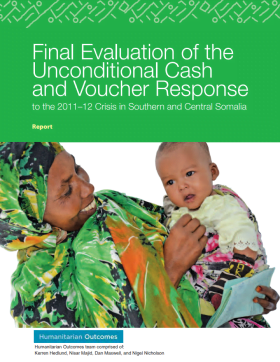
Final Evaluation of the Unconditional Cash and Voucher Response to the 2011–12 Crisis in Southern and Central Somalia
Report
This report sets out to determine the effectiveness of the unconditional cash and voucher interventions in southern and central Somalia. This evaluation however cannot be limited to the interventions at hand. It necessarily considers the broader context that led to the failure of the humanitarian...
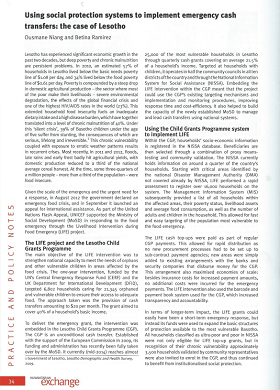
Using social protection systems to implement emergency cash transfers: the case of Lesotho
Report
Lesotho has experienced significant economic growth in the past two decades, but deep poverty and chronic malnutrition are persistent problems. Given the scale of the emergency and the urgent need for a response, in August 2012 the government declared an emergency food crisis, and in September it...
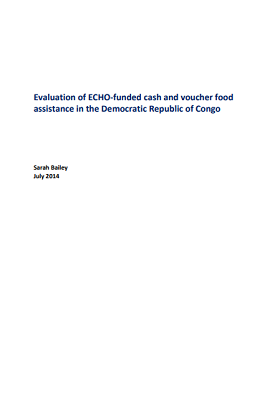
DRC Cash and Vouchers Food Security Evaluation (2014)
Report
People in eastern Democratic Republic of Congo (DRC) have long faced protracted conflict and instability resulting in the displacement of populations. In order to provide households affected by new displacements with timely access to food, ECHO funded the Norwegian Refugee Council (NRC), the Association...
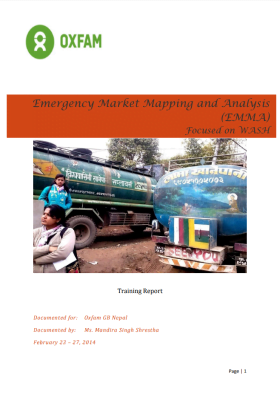
Training Report – Emergency Market Mapping and Analysis (EMMA): Focused on WASH
Report
Emergency Market Mapping Analysis (EMMA) is a toolkit guidance manual for humanitarian staff in sudden-onset emergencies which aims to improve emergency responses by encouraging and assisting relief agencies to better understand, support and make use of local market-systems in disaster zones. EMMA offers...
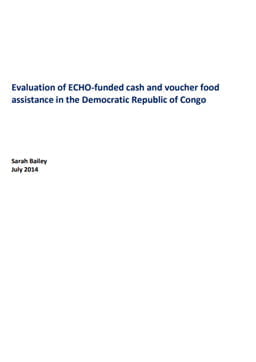
Evaluation of ECHO-Funded Cash and Voucher Food Assistance in the Democratic Republic of Congo
Report
People in eastern Democratic Republic of Congo (DRC) have long faced protracted conflict and instability resulting in the displacement of populations. In order to provide households affected by new displacements with timely access to food, ECHO funded the Norwegian Refugee Council (NRC), the Association...


